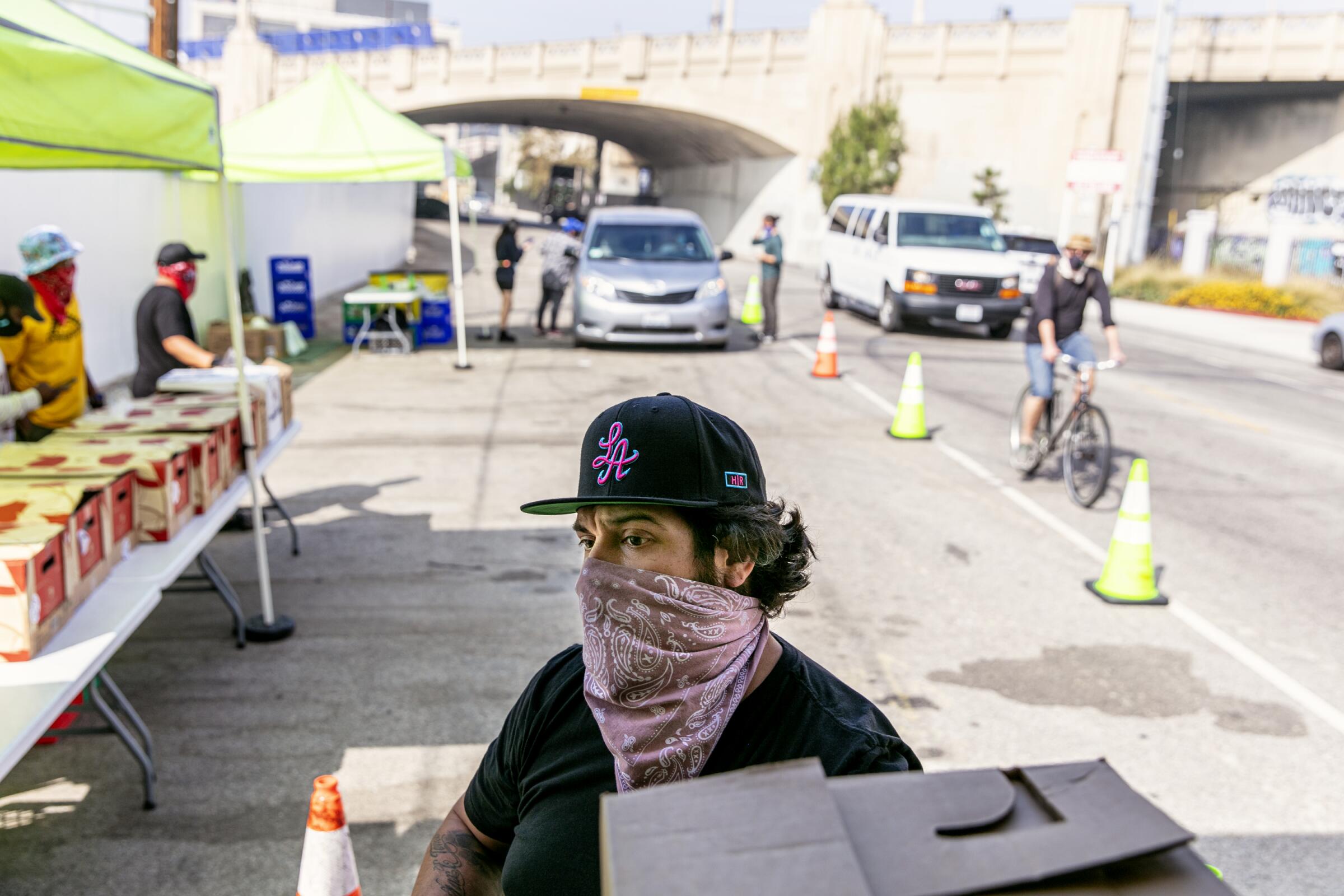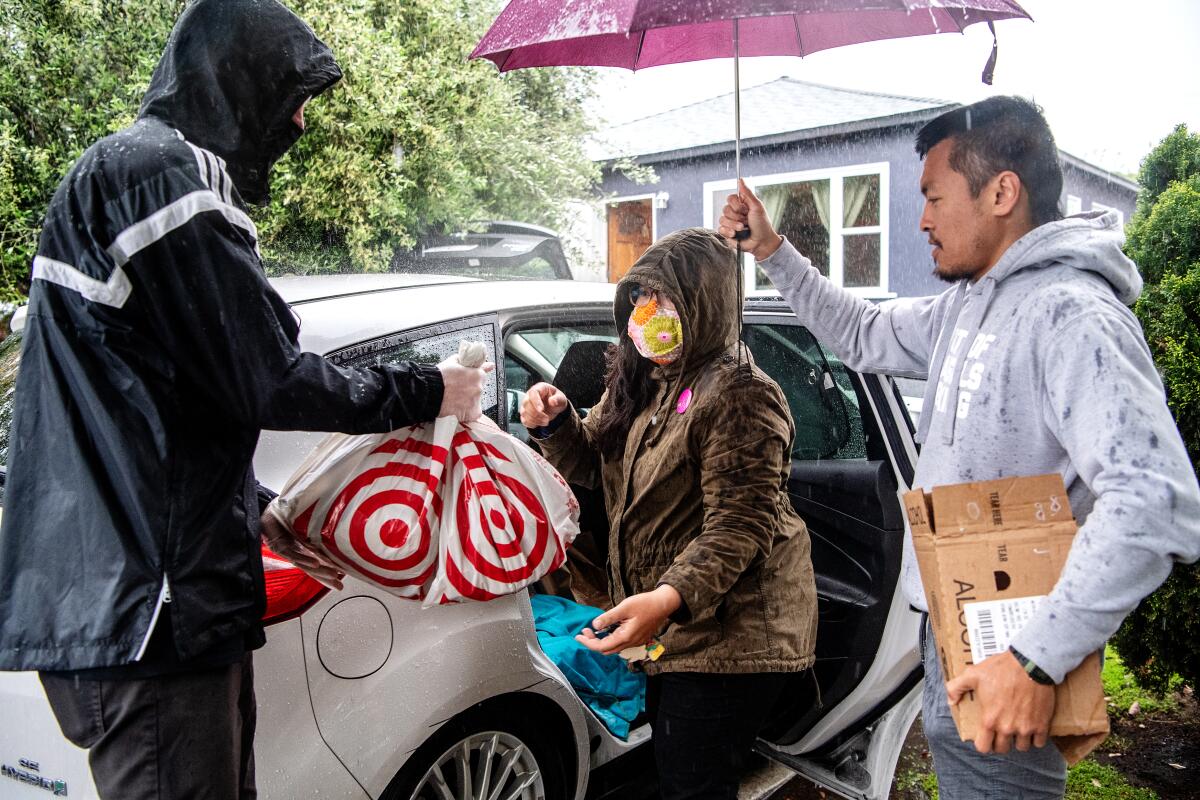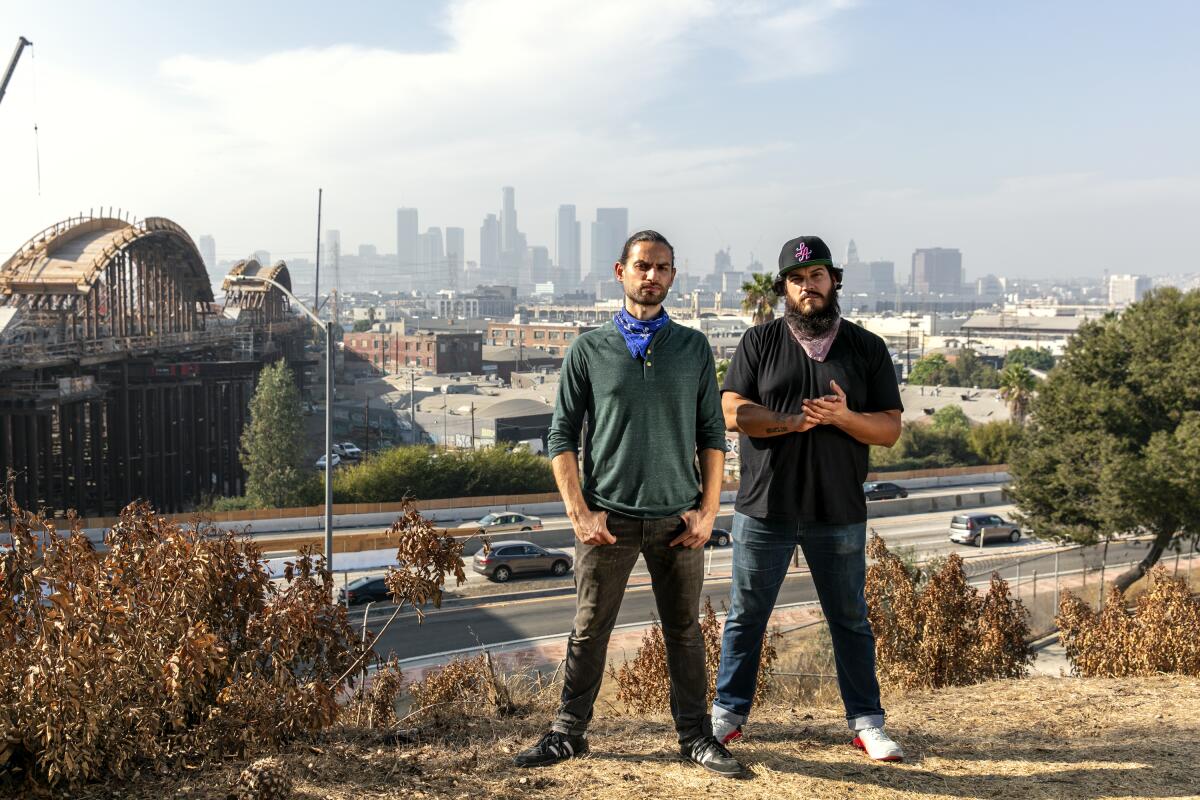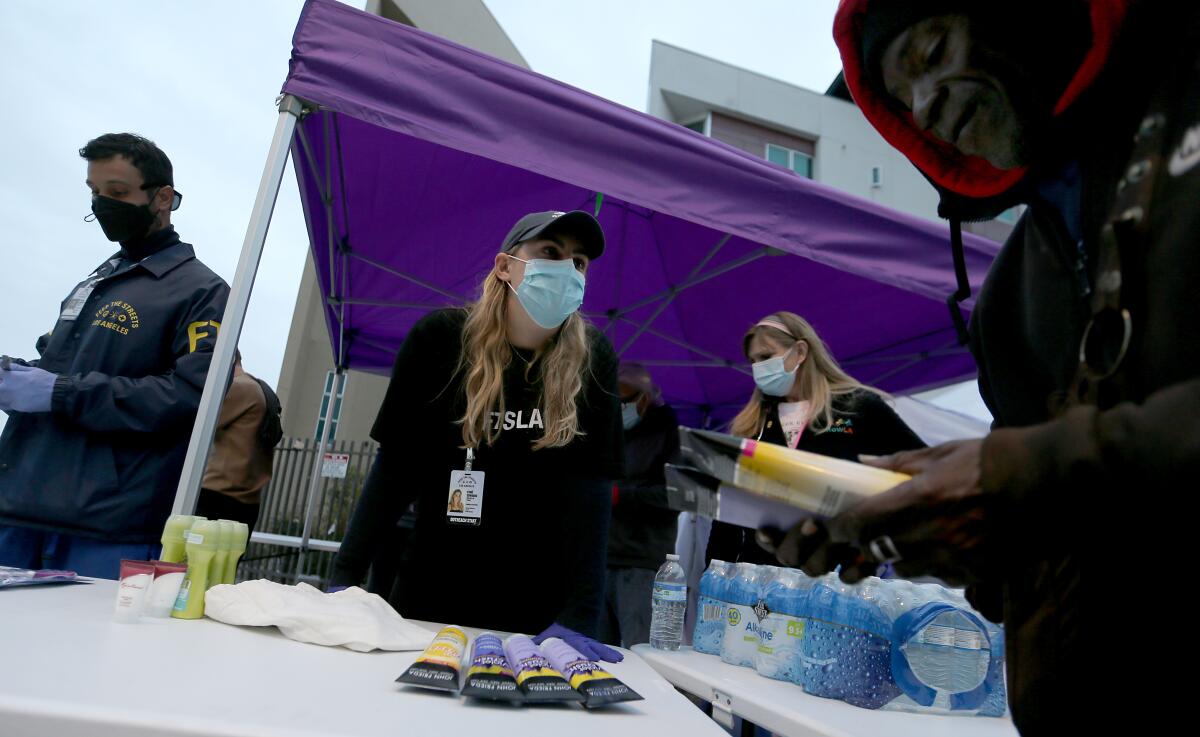Newsletter
Eat your way across L.A.
Get our weekly Tasting Notes newsletter for reviews, news and more.
You may occasionally receive promotional content from the Los Angeles Times.

It starts with a phone call from the 707 area code.
“Hello, my name is Damián Diaz. I’m calling on behalf of No Us Without You.”
From his end of the line, Diaz often hears the hurried shuffling of someone stirring, as if his call is what this person has been waiting for. Sometimes he’s put on speaker and can hear a voice call out, “Please, mijo. Come here. I need you to translate.”
As part of the enrollment process for No Us Without You LA, a Boyle Heights-based nonprofit that provides food and support for back-of-house hospitality workers without legal status who were affected by the COVID-19 pandemic, Diaz begins with a series of questions to verify employment history: “Where did you work? How long haven’t you worked? Do you have a pay stub to prove that you worked?”
Diaz then asks the question he says is usually met with silent hesitance: “Do you qualify for any type of unemployment or any type of resource from the government?”
“This is always a 50-50,” said Diaz. “Are they going to lie to me and say I do qualify because they think that if they say no, they’re not going to qualify for us, or are they going to work up enough courage and be like, you know what, I don’t qualify for anything because of me being undocumented?”
The process can be painful, “like pulling teeth,” said Diaz. Many of the people he talks with have been burned before by organizations that have made empty promises. Out of work and desperate, they take a risk by sharing their legal status over the phone with a stranger.
“I have to sometimes rip open old wounds, so that I can level out the playing field so that they know it’s real, that this organization means well for them,” said Diaz. “I almost have to take breaks in between calls, because I get so worked up, because that’s the only way for them to realize that this person [on the phone] is human, understands my angst, understands what I’m going through. And then they just sometimes cry or start bawling out of joy, like, I can’t believe I’m getting this call to help.”
For undocumented restaurant workers, life during coronavirus has few safety nets.
The pandemic has delivered on what many in the food-justice space feared and warned against when it began its deadly, out-of-control path a year ago. Few have been spared the virus’ heavy hand, but existing inequities that run deep across the Southland and beyond have been exacerbated, particularly among disadvantaged communities of color, the unhoused and those without legal status.
But where there has been great need, Angelenos have stepped up to help feed their neighbors, some of whom have been pushed into desperate circumstances for the first time and many others who have long struggled to exist along the margins. Between the gaps in services and support, mutual aid groups have been a critical safety net. To no one’s surprise, these community-driven initiatives have been busier than ever, organizing to get food, hygiene products and other essential goods and services to vulnerable populations.
“The network has grown so much. The network itself is so robust,” said Melissa Acedera, who gave up her full-time job doing compliance work for a food and beverage company in August to dedicate herself to food justice and her mobile food pantry, Polo’s Pantry. “The demand was going up but the support and also the energy for mutual aid was growing too. There was a lot more interest in it. Across the board, there was a lot more resources and other opportunities to develop it.”
One of the earliest opportunities for Polo’s Pantry was a collaboration with the community service-driven nonprofit Eayikes called Home-y Made Meals. Across L.A. County, more than 1,000 volunteer chefs and drivers prepare and deliver meals to Home-y Made Meals’ partners, including the Los Angeles Community Action Network on Skid Row, Street Watch L.A. and Ktown for All. Since March 26, 2020, they’ve made and distributed 45,000 meals, Acedera said.

On skid row, the epicenter of L.A.’s homelessness crisis, several organizations are working to ensure residents have healthy, dignified food choices.
“That’s just a people-powered initiative,” she added. “Now, it’s its own movement.”
Mutual aid work isn’t new, but during the pandemic, it’s become more important for the myriad organizations to communicate and collaborate to effectively share and move resources across the region.
“We’ve always been doing this. There’s always been invisible systems of safety for people,” said Acedera. “Before, we were all kind of siloed in L.A. I think that’s part of the geography of this space, because it’s so broad and there’s so much. There’s so many neighborhoods, and each neighborhood has its own needs and wants.”
In September, Acedera partnered with Marina Vergara, an organizer behind Los Angeles Community Fridges, to help farmworkers in Oxnard. They connected with Carmen Obeso, who started a program that distributes essential goods to fellow farmworkers called Campesino a Campesino. Reaching out to their respective networks, Acedera was able to secure hundreds of volunteer-made meals from the Hollywood Food Coalition and groceries from God’s Pantry in Pomona, while Vergara reached out to the nonprofit Food Forward, which redirected 20 pallets of produce to farmworkers.
“It really sounds like the story of the fishes and loaves from the Bible,” Acedera said of a recent food distribution event in Oxnard, where around 600 cars lined up to receive boxes of fresh produce. “That’s enough to last them, I would say, two weeks. It’s incredible.”
A visit to Oxnard shows the difficulties facing California’s Latinos in the fight against the coronavirus.
Before No Us Without You LA, Diaz and cofounder Othón Nolasco, along with their business partner Aaron Melendrez, ran a bar consultancy firm, Va’La Hospitality. When restaurants and bars were first ordered to shut down in March 2020, the trio turned their attention to colleagues and former co-workers, some of whom were without legal status, suddenly out of work and ineligible to receive unemployment benefits or other government food assistance but also largely ignored by online crowdfunded charitable efforts.
“No amount of hustling and trying to keep [Va’La Hospitality] afloat was going to matter,” said Nolasco.

After stocking up on produce and groceries at a wholesale restaurant supplier and assembling them into food packages, No Us Without You LA was able to feed 30 families by the end of its first week in March 2020. By the end of the month, the group was serving 120 families a week. Now, a year later and with Diaz and Nolasco leading the way, the nonprofit is moving about 160,000 pounds of food per week through its Boyle Heights facility. Aided by a fleet of 30 volunteer drivers, the organization is able to conduct four drive-through contactless food drops each week and serve 1,600 families.
“Undocumented hospitality staff have been feeding Los Angeles for years,” said Nolasco. “Now it’s our turn to feed [them].”
Bicycle Meals also was born out of the pandemic. Its founder, Virginia native Michael Pak, has made Koreatown his home for the last decade. In that time, he’s become an unofficial mayor of sorts, cofounding the Koreatown Run Club and the smashburger pop-up Love Hour; his popular Instagram and Twitter accounts both carry the handle @koreatown. It’s that love for his adopted home that moved him to address an uptick in homelessness. Challenged by his friends to act, he invited his Instagram followers to join him with their bicycles to ride around Koreatown and distribute lunch bags to their unhoused neighbors.
“We do our best to provide but on top of that, how do we set them up for success? That’s just something we always think about — how do we gift our neighbors a better life?” said Pak, who leads a team of cyclists on Fridays. His friend Jacob Halpern coordinates rides on Mondays. Bicycle Meals provides 140 to 200 homemade lunch kits per week with an eye toward more distribution days.
“It’s a community thing, which is really awesome,” said Halpern. “The real motivation is definitely just seeing homelessness as an injustice … especially if it’s happening right in your own neighborhood.”
A familiar refrain from organizers is that mutual aid groups must prioritize the needs of the people they serve. While food equity is at the heart of much of their work, many groups have expanded their services. No Us Without You LA has begun offering tutoring services to children who have fallen behind in school during the pandemic while also using its established connections in the hospitality industry to help clients with job placement.
“You need to know what the need is, and you need to know by being there. It’s ... assumption versus actually going in,” said Esmé Edwards, director of operations for Feed the Streets L.A., which also provides tents, tarps, first aid and hygiene products to unhoused people. More recently, the nonprofit has begun to reach out to and collect donations for sex workers and is exploring partnerships to provide mental health services, Edwards said. “That’s super important too. Just asking people what they want and what they need … and then following through and showing up.”

::
While mutual aid groups have been vital in filling in the gaps, their reach is limited in a state as big as California. Away from metropolitan centers, the resources and manpower to address critical needs are in short supply. Two pending state initiatives may help narrow those gaps.
Around seven in 10 eligible Californians receive federal food assistance through CalFresh, federally known as the Supplemental Nutrition Assistance Program, or SNAP. The national average stands at about 85% of those who are eligible.
“There are states that do not have the progressive policies that California has ... that do better than us, and that, I think, really says that we’re not using every tool in our toolbox,” said Jared Call of Nourish California, an Oakland-based nonprofit and advocate for statewide food policy.
SB 107, which made it through the state Senate Human Services Committee with unanimous bipartisan support last week, aims to address problems with access and participation among Californians with disabilities and those ages 60 and older by streamlining “what is unfortunately a very complicated and often burdensome [CalFresh] enrollment process,” said Call. Meanwhile, SB 464, which heads to its first hearing with the committee this month, proposes to open access to CalFresh and the state-funded California Food Assistance Program to all Californians, regardless of immigration status.
“Food justice is a matter of values. What are our values as a nation and as a state? We believe no one should go hungry in California, and public policy needs to set the conditions for that to be achieved,” said Call. “[Food] is something we produce a surplus of, especially in California, so it’s clearly a matter of prioritization and distribution, and ensuring that people have enough resources to get food should be a core value of the state and of the country.”
Eat your way across L.A.
Get our weekly Tasting Notes newsletter for reviews, news and more.
You may occasionally receive promotional content from the Los Angeles Times.